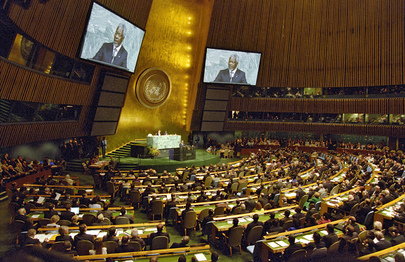Dangers grow for Myanmar quake survivors, health system ‘overwhelmed’
It’s been 10 days since a 7.7 magnitude quake levelled buildings and buckled bridges across central Myanmar.
Today, in the worst-hit areas, people sleep in the streets in fear of buildings collapsing, while early monsoon storms have added to their misery and increased the risk of waterborne diseases, the UN warned on Tuesday.
Speaking from the devastated city of Mandalay, Titon Mitra from the UN Development Programme (UNDP) said that the latest death toll has passed 3,500 and is likely to rise.
Well over 4,000 people were injured in the quakes last week and more than 80 per cent of buildings have been damaged – especially in the major urban centres of Sagaing, Mandalay and Magway.
Here’s UNDP’s Mr. Mitra now:
“Shelter is a really big issue and we’ve had recent rains. So, people who are really fearful to go back into their homes are sleeping on the streets at night. And they’re often without any sort of cover. Food is an immediate issue. Markets are severely disrupted, not operational, certainly in Sagaing and Magway… and sanitation is now becoming a big issue as people who have been forced out of their homes are resorting to open defecation.”
As part of the UN response, UNDP is carrying out rapid building assessments just to see if they are safe to use. One hospital in Sagaing is now treating patients outdoors in 40 degree-centigrade heat because of safety fears.
According to the UN humanitarian affairs coordination office (OCHA), more than 500,000 people across the country have been left without access to life-saving healthcare.
DR Congo crisis: 41,700 refugees have fled violence to Uganda
To Uganda, where reception centres for refugees fleeing ongoing violence in the Democratic Republic of the Congo (DRC) are six times over-capacity.
In an alert, the UN refugee agency, UNHCR, said that more than 41,000 people have arrived in neighbouring Uganda since the start of the year; eight in 10 are women and girls.
Matthew Crentsil who represents UNHCR there, said that nine children have died from malnutrition since the beginning of the year after falling sick in the DRC, where Rwanda-backed rebels have taken key cities and are alleged to have carried out grave rights abuses, including sexual violence and killings:
He said chronic funding cuts to humanitarian assistance by the United States and others, threaten to “crash” UNHCR’s work in Uganda within months:
“There has been an average of 10 to 12,000 refugees entering the country every month nonstop, since 2022. And this is putting a lot of strain on the resources that we have. At the same time, funding is going down. So, we are doing our best to avert a disaster, for now, but if we don’t get the immediate injection of additional resources, we are going to crash from the middle of the year onwards.”
According to the UN agency, the numbers of people arriving in Burundi from the DRC has fallen in recent weeks. The sports stadium in Rugombo now serves primarily as a registration centre.
Registered refugee arrivals in Burundi and Uganda now number 113,000, with around two times more fleeing to Burundi.
Gaza: Aid teams and partners continue essential humanitarian work
To Gaza, where latest UN data indicates that nearly 400,000 people have been displaced since the breakdown of the ceasefire on 18 March, representing 18 per cent of all Palestinians in the shattered enclave.
Meanwhile, UN aid teams and partners continue to provide services and assistance to the most vulnerable Palestinian communities, amid the ongoing Israeli blockade and bombardment.
In an update on Tuesday, the UN refugee agency for Palestine refugees, UNRWA, confirmed it was continuing to provide essential health, sanitation and displacement camp services.
Eight UNRWA health centres are still operational along with 39 medical points run by the UN agency. But medical services are critically under-resourced; more than 63 per cent of essential supplies are projected to run out in under two months.
Around 12,000 medical consultations take place in UNRWA centres every day and the agency also supports services for nearly 100,000 displaced people in 115 shelters.
Daniel Johnson, UN News
Music composed and produced by Joachim Harris. All rights reserved
Source of original article: United Nations (news.un.org). Photo credit: UN. The content of this article does not necessarily reflect the views or opinion of Global Diaspora News (www.globaldiasporanews.com).
To submit your press release: (https://www.globaldiasporanews.com/pr).
To advertise on Global Diaspora News: (www.globaldiasporanews.com/ads).
Sign up to Global Diaspora News newsletter (https://www.globaldiasporanews.com/newsletter/) to start receiving updates and opportunities directly in your email inbox for free.





























